
Salam Kehne Mein Musalman Ka Haq
Most Surely Man Is Despairing, Ungrateful And Exulting, Boasting
[11. Surah Hud: Ayah 9] And if We make man taste mercy from Us, then take it off from him, most surely he is despairing, ungrateful.
[11. Surah Hud: Ayah 10] And if We make him taste a favor after distress has afflicted him, he will certainly say: The evils are gone away from me. Most surely he is exulting, boasting.
[11. Surah Hud: Ayah 11] Except those who are patient and do good, they shall have forgiveness and a great reward.
[70. Surah Al-Ma’arij: Ayah 19] Surely man is created of a hasty temperament.
[70. Surah Al-Ma’arij: Ayah 20] Being greatly grieved when evil afflicts him.
[70. Surah Al-Ma’arij: Ayah 21] And niggardly when good befalls him.
[70. Surah Al-Ma’arij: Ayah 22] Except those who pray.
[70. Surah Al-Ma’arij: Ayah 23] Those who are constant at their prayer.
[70. Surah Al-Ma’arij: Ayah 24] And those in whose wealth there is a fixed portion.
[70. Surah Al-Ma’arij: Ayah 25] For him who begs and for him who is denied (good).
Our Lord! grant us good in this world and good in the hereafter, and save us from the chastisement of the fire.
Khatma Bil Khair
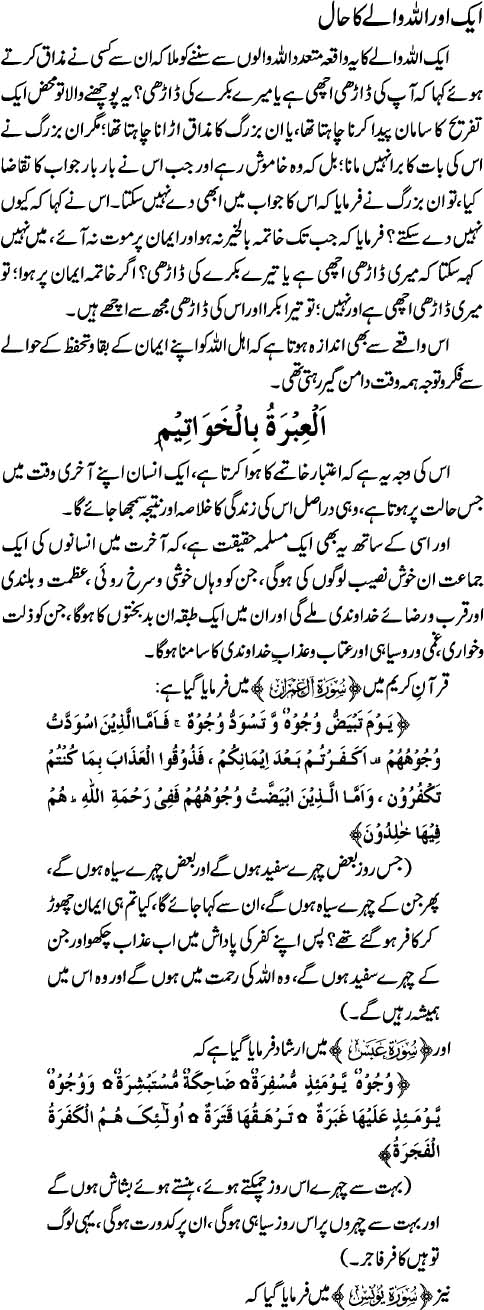
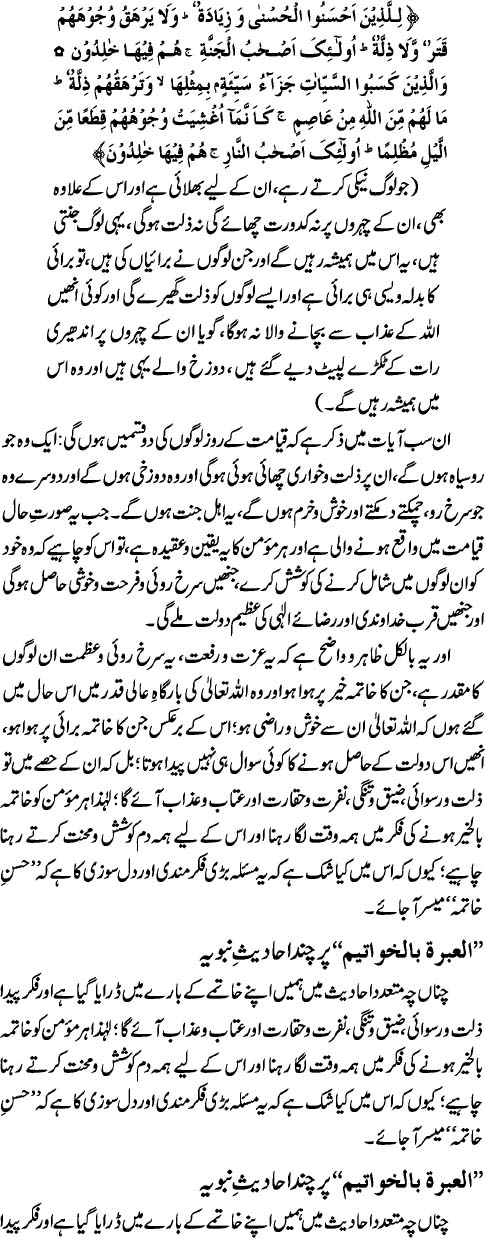
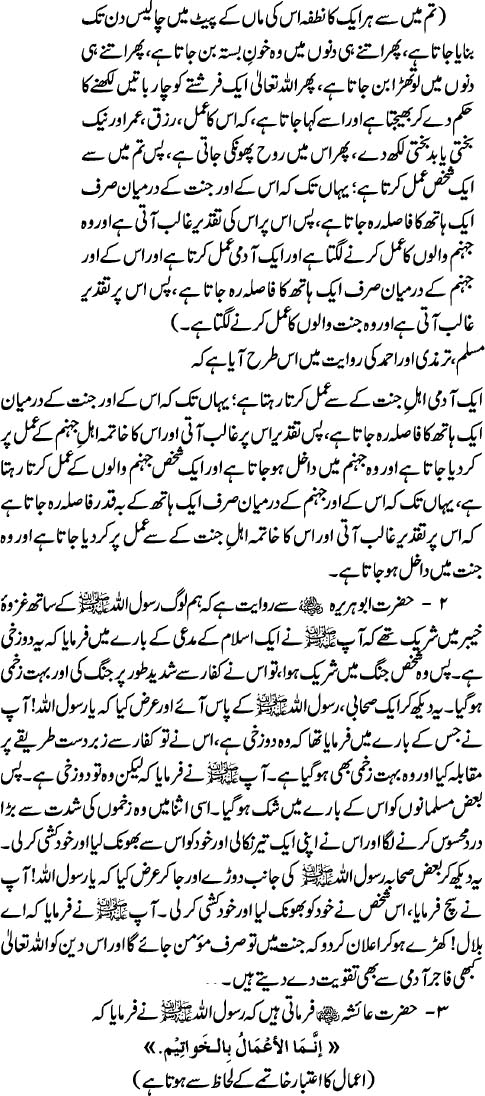
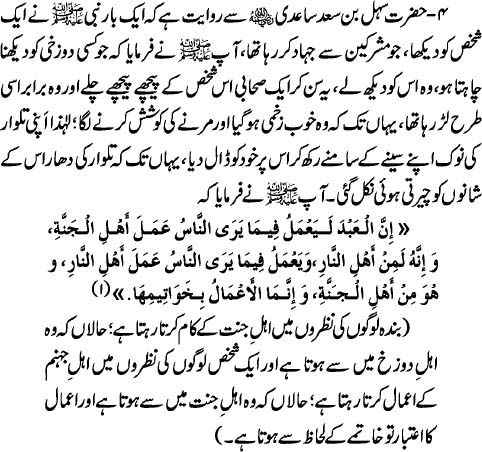
Khatma Bil Khair: Haqeeqi Kamyabi
The Virtue Of The Last Ten Days Of Ramadan And Laylat al-Qadr
Praise be to Allah, the Lord of the Worlds, and peace and blessings be upon the Trustworthy Prophet Muhammad and upon all his family and companions.
The Prophet (peace and blessings of Allah be upon him) used to strive hard (in worship) during the last ten days of Ramadan in a way that he did not strive at any other times. (Muslim, 1175, from Aa’ishah). Among the things he did were secluding himself in I’tikaaf and seeking Laylat al-Qadr during this time. (Al-Bukhaari, 1913; Muslim, 1169). In al-Saheehayn it is reported from the hadeeth of Aa’ishah (may Allah be pleased with her) that when the last ten days of Ramadan came, the Prophet (peace and blessings of Allah be upon him) would stay up at night, wake his family and gird his loins. (al-Bukhaari, 1920; Muslim, 1174). Muslim added: he strove hard and girded his loins.
Her phrase “girded his loins” is a metaphor for his preparing himself to worship and strive hard in worship, more than usual. It has the meaning of “rolling up one’s sleeves” to worship (i.e. getting ready to make a great deal of effort).
It was also said that it was a metaphor for keeping away from women and abstaining from sexual relations.
The phrase “stay up at night” means that he would stay awake, spending the night in prayer, etc. It was reported in another hadeeth that Aa’ishah (may Allah be pleased with her) said: “I never saw the Prophet (peace and blessings of Allah be upon him) recite the entire Quran in one night, or spend a whole night in prayer until the morning, or fast an entire month, except in Ramadan.” (Sunan al-Nasaa’i, 1641). The words “stay up at night” may mean that he spent most of the night in worship, or that he did not stay up for the entire night, but he did that at the times of Ishaa and Suhoor, and other times, in which case it would mean that he stayed up for most of the night.
The phrase “and wake his family” means that he would wake his wives to pray qiyaam. It is known that he (peace and blessings of Allah be upon him) used to wake his wives all year round, but he used to wake them to spend part of the night in qiyaam. In Saheeh al-Bukhaari it is reported that the Prophet (peace and blessings of Allah be upon him) woke up one night and said, “Subhan Allah! What tribulations have come down tonight! What treasure has come down tonight! Who will wake up the dwellers of the apartments There may be women who are clothed in this world and naked in the Hereafter”. (al-Bukhaari, 1074). It was also reported (in Saheeh al-Bukhaari) that he (peace and blessings of Allah be upon him) used to wake Aa’ishah (may Allah be pleased with her) when he wanted to pray Witr. (al-Bukhaari, 952). But when he woke his wives during the last ten nights of Ramadan, this was more persistent than at other times of the year.
The fact that he (peace and blessings of Allah be upon him) did this indicates the importance he attached to worshipping his Lord and making the most of this special time.
The Muslim should follow the example of the Prophet (peace and blessings of Allah be upon him), for he is the best example, and he should strive hard to worship Allah. He should not waste the hours of these days and nights. For we do not know, perhaps this time will never come again, for the spoiler of pleasures, i.e., death, which must come to all men, may come and snatch him and his life will end; then he will feel regret at the time when regret will be of no avail.
Among the unique virtues of these special nights is that Laylat al-Qadr is among them. Allah says (interpretation of the meaning):
Haa-Meem. [These letters are one of the miracles of the Quran and none but Allah (Alone) knows their meanings.]
The Manifest Book (this Quran) makes things clear.
Paroosi Kay Haqooq
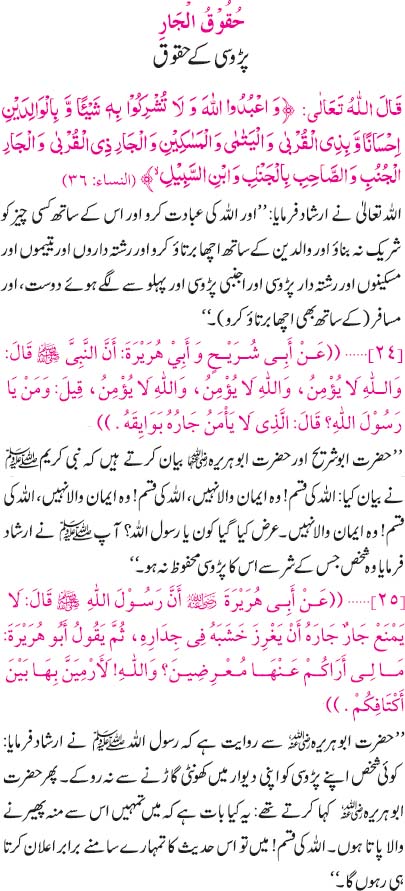
Paroosi Kay Haqooq
Better Than A Thousand Months
God has ordained that we fast during the month of Ramadan, every day from dawn to dusk, during which time we abstain from eating, drinking, and sex. The Prophet (peace be upon him) also recommended us to spend part of the time during the night in voluntary worship. This is done after we have prayed Isha, offering more prayer every night throughout the month. This is known as Taraweeh prayer, which consists of either eight or 20 rak’ahs, or any lesser number.
However, the Prophet used to spend more of the night in voluntary worship during the last 10 days of Ramadan. Ayesha reports: “When the last 10 days (of Ramadan) arrived, the Prophet would be more diligent, staying up the nights and waking up the people in his household.” (Related by Al-Bukhari).
Ayesha tells us that the Prophet did certain special things in the last ten days of Ramadan. These are the best nights of the year to spend in worship. One thing was to wake up his family members to encourage them to allocate time for night worship. He did not make this obligatory, but whereas on other nights he left them to decide whether they wanted to wake up for night worship, he did wake them up in the last third of Ramadan. Needless to say, he only woke up those who were willing and able to offer night worship. Since this is voluntary, he would not compel anyone to do anything unless it is their own choice.
Another thing that he did was to be more diligent. In the Arabic text of the Hadith, Ayesha uses a metaphor, saying that the Prophet would “tighten his robes.” Most scholars suggest that this means that he abstained from having sex with his wives during those 10 nights. There is no prohibition on that, but this was the Prophet’s choice.
Moreover, the Prophet “stayed up the nights” offering worship. According to most scholars, this means that he spent more time in worship during these 10 nights than on other nights. It does not mean that he would spend the whole night because that would be too exhausting. Moreover, it would mean that we sleep longer during the following day, which reduces the feelings of fasting.
What is special about the last 10 days of Ramadan is that they include the Night of Power. This is the night described in the Qur’an as “better than a thousand months,” which means that spending this night in worship earns a greater reward than worshipping at night for a thousand months. It is a special, blessed night because it witnessed the revelation of the Qur’an from on high to Prophet Muhammad. In other Hadiths, we are told that dedication to worship on that night ensures that our slate is wiped clean and we are free of all sins. They are all forgiven by God. Hence, we should be keen to spend that night in worship.
When is the Night of Power? It has not been mentioned specifically, either in the Qur’an or by the Prophet. However, the Prophet tells us to seek it on the odd nights of the last third of Ramadan. Thus, it could be any night on 21, 23, 25, 27 or 29 of Ramadan. In Islam, the night precedes the day, which means that it is the night that begins after sunset on 20, 22, etc. of Ramadan. If we dedicate several hours of that night to worship, we feel great relief and happiness for the effort making us keen to repeat the experience every year.
– By Adil Salahi
Istighfar Aur Tauba: Rizq Ka Sabab
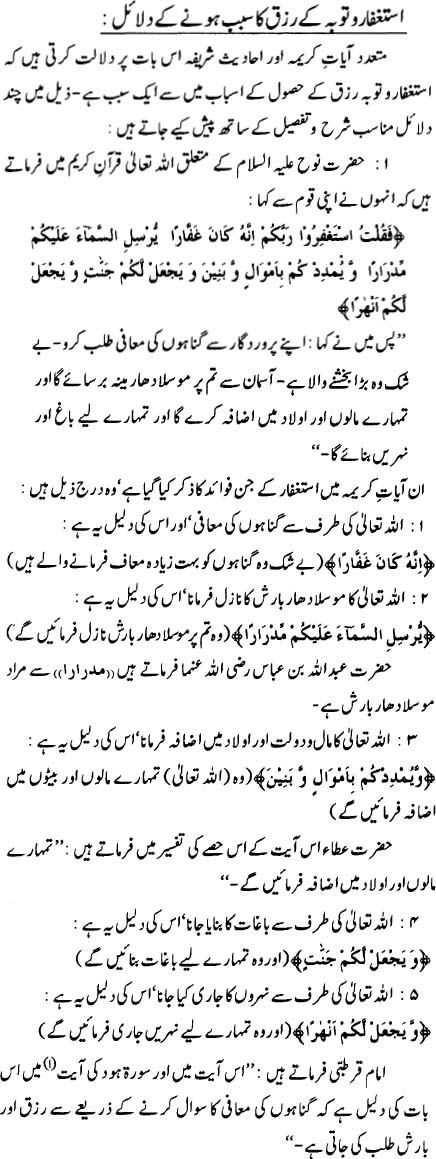
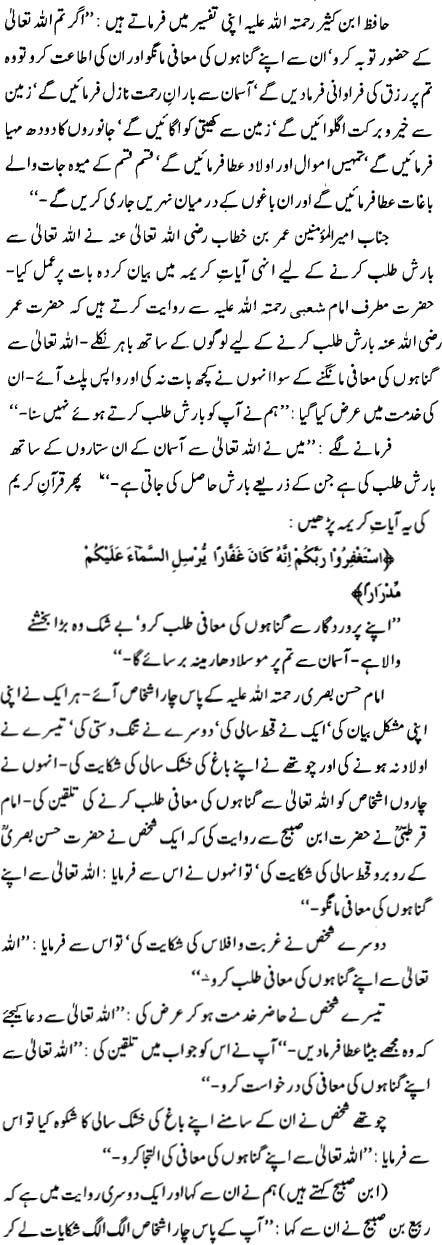
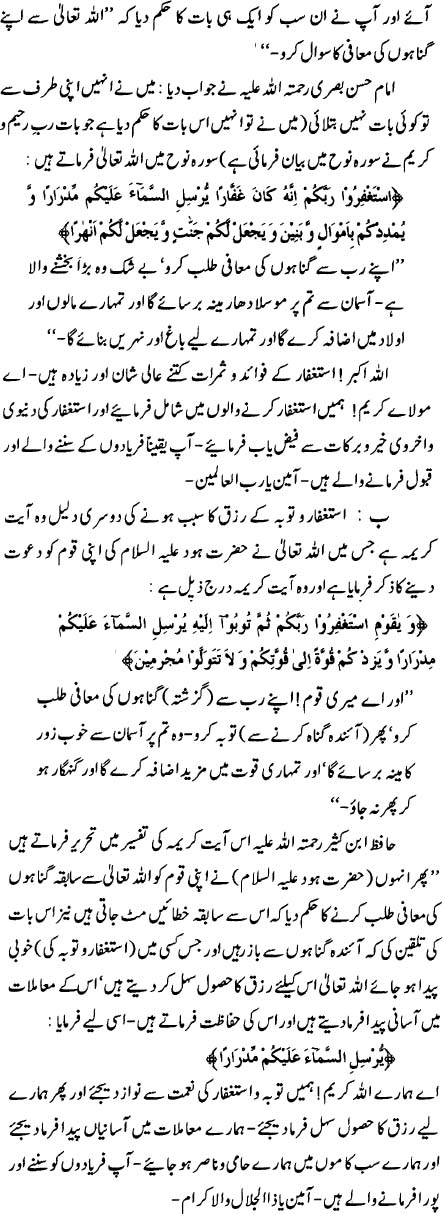
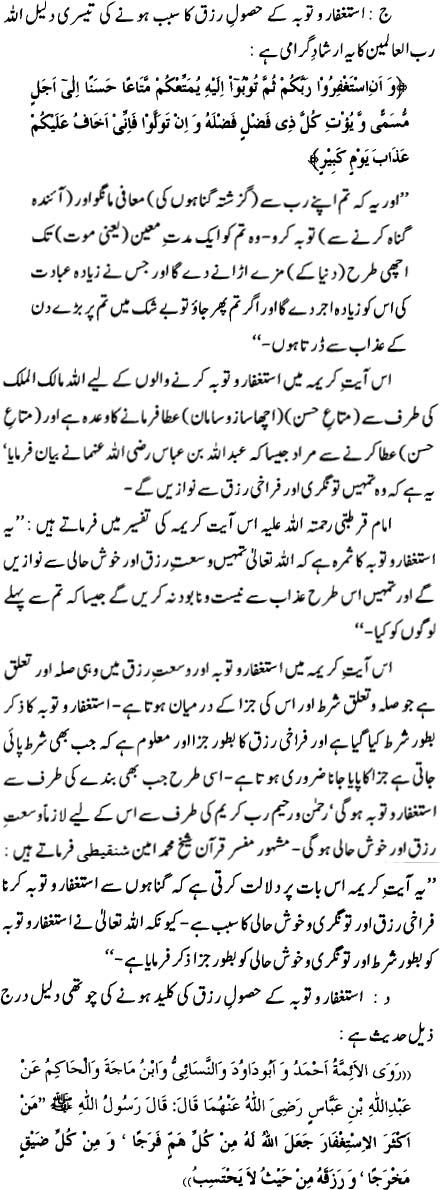
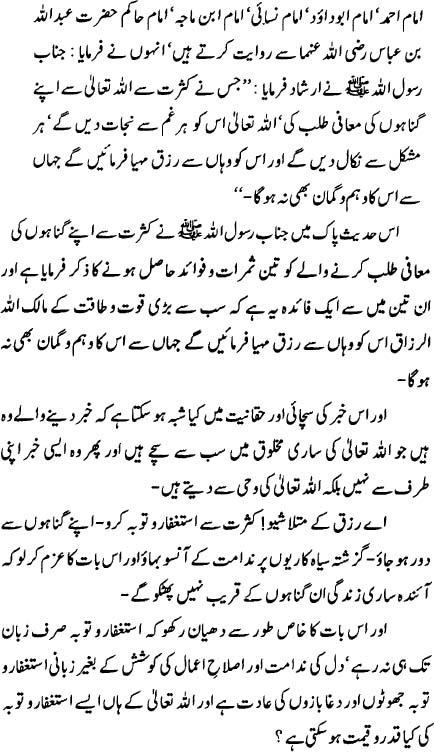
Istighfar Aur Tauba: Rizq Ka Sabab
Make Best Use Of Remaining Ramadan Days
Recite the Quran, give in charity, and do good deeds. Ramadan is the month of reciting the Quran, the month of worship and Taraweeh prayer, patience, soul-searching, repentance, and a time to change.
Allah revealed His Book as the guide to the whole of mankind. If a person recites the Quran the way it should be recited, then it is a remedy and a cause for opening the doors of good, well-being, steadfastness, happiness, peace of mind, pride, and victory. The laws should be based on the Quran and the Holy Quran is the remedy for Ummah’s ailments. There is no reformation for mankind or peace of mind and comfort or security or discipline except by following the teachings of the Quran.
The Quran is addressed to all mankind. There are no differences between male and female or rich and poor. The Quran addresses everyone. Allah’s Holy Book transcends the limits of time, place, and differences among people. Its message is universal for all human beings and the jinn. The Holy Quran is the path to the happiness of the Ummah and all mankind. It is the Quran that abolished bondage and educated the Ummah.
The month of hard work, patience, discipline, and recitation of the Quran. Now we are in the last few days of Ramadan and Muslims are to make an added effort by offering prayer, recitation of the Quran, and doing good deeds with the hope that one of these blessed nights will be the Night of Power (Lailat Al-Qadr). People must do soul-searching, contemplation, repent of their deeds, and mend their ways for the better because death comes suddenly. Muslims to be God-fearing and observe Taqwa.
Make the best use of the remaining few days of Ramadan by offering prayer, reciting the Quran, giving in charity generously, and doing other good deeds with the hope that a night during these 10 days may be the Night of Power (Lailat Al-Qadr).
All should be extra prepared to do good deeds before death when it is too late. The Muslims must work harder during the last 10 days of Ramadan because the Prophet (peace be upon him) did not specify when the Night of Power occurs but said it is on the odd nights like the 21st, 23rd, 25th, 27th, 29th, or the last night.
If Lailat Al-Qadr coincides with the night when the Muslim is working hard in prayer, reciting the Quran, and doing other good deeds, then his sins will be forgiven. Muslims should sincerely fear Allah and adhere steadfastly to Islam.
Don’t forget the importance of giving Zakat Al-Fitr as it purifies the fasting because there might be some shortcomings in one’s fasting. It should be given on Eid Day before Eid prayer and it is allowed to give Zakat Al-Fitr one or two days before Eid Al-Fitr day.
Faqeero, Maskeeno Aur Mohtajo Ka Khyal Rakho

Faqeero, Maskeeno Aur Mohtajo Ka Khyal Rakho
How Can I Describe Ramadan To A non-Muslim Audience?
Sometimes, as Muslims, we talk so much to others about what we believe and do, without thinking too carefully about what they are hearing. In other words, what we say is not always the message that other people hear, because we are not prepared to take people as they are.
Often, we talk to them from the point of view of where we would like them to be, rather than where they actually are at the moment.
For example, if someone is only interested in football or fashion, we should begin talking to them first about football and fashion. Explaining to them the finer points of Shariah law is getting a bit ahead of ourselves if they are struggling with the idea of whether or not God exists.
Talking about Ramadan is a wonderful way of talking about Islam, but we must remember that those who are not Muslim will be carrying with them all the baggage that the television and news media have loaded on their shoulders.
Television images of suicide bombs and terror attacks have a powerful way of clouding the real message we want to present. So, in talking about Ramadan we need to proceed slowly.
If you have ever read a really good novel or been to see a really good film at the cinema, it is difficult to convey how much you enjoyed it to someone who did not read the book or see the film. No matter how much you describe the action and the characters, you need to have experienced them firsthand to fully appreciate how good they are.
Ramadan is a bit like that. Telling someone who has not experienced the joy of Ramadan exactly what it is like is just like telling them about a film they have not seen.
The idea of fasting for a whole month is quite alien to most people in the world. Cutting down on food for a while to lose weight is perhaps the nearest they have ever got to fasting. Doing so for God’s sake will be quite outside their experience.
And yet, as Muslims, we know that Ramadan is about far much more than giving up food and drink during the hours of daylight. We know that with the right intention, we can come closer to Allah during this noble month of Ramadan and we can feel both uplifted and content by the very fasting that seems to others so odd.
The first thing we need to tell others is that we fast for Allah’s sake alone. This, in itself, may come as a very strange idea. Most people, especially those with no religion or belief in God, do things for themselves alone or for the ones they love. Allah tells us in the noble Quran, which Muslims believe is the word of God, that means: {O you who believe! Fasting is prescribed to you as it was prescribed to those before you, that you may (learn) piety.} (Al-Baqarah 2:183)
In other words, Muslims fast to please Allah. Even if there is no other outward benefit or effect, their fast is for Allah’s sake. He has asked it of us and we do it in response to His command. This, alone, is quite a shock to the belief system of many. Muslims are not fasting because of anything they will gain; they are fasting because Allah wants them to do so.
This, though, is maybe one of the greatest secrets of Islam… The word Islam comes from an Arabic root word that means both “submission” and “peace.”
A Muslim is one who submits to Allah. When his or her head touches the ground in prayer there is the realization that Allah the Almighty is in charge of all things in this world, even us. He not only created the heavens and the earth and everything in between, but He also knows every leaf that falls from every tree.
Submitting to Allah is the key. By submitting, we then experience the second word: peace. Muslims find their total peace, fulfillment, and happiness by doing what Allah wants. fasting, then, is done for His sake. Yet we gain so much in return and feel so much better because of it. Maybe this is the key.
Another useful idea when talking to those who are not Muslim about Ramadan is to remind everyone just how wonderful it would be if everyone in the world was given the chance to start over again, to forget the mistakes of the past, and begin a new one.
There are not many people who would turn down such an opportunity. All of us have made mistakes. We also deliberately do things we know to be wrong.
Ramadan is a chance for Muslims to re-examine how they have lived their lives over the past year. They can resolve to lead a better life in the year to come.
It is like a spiritual spring cleaning, where we dust everything down, and throw out everything that is not important and essential in our lives.
Seen in these two ways, then, fasting during Ramadan brings us so many blessings, not least the blessing of seeing how fortunate we really are.
True enough, we fast for Allah’s sake during the hours of daylight, but when the call to Prayer sounds at the end of the day, we are able to eat our fill. There are many in the world, though, whose fast will not end with the call to Prayer. They will starve to death because they have no food.
Our fasting in Ramadan gives us the chance to feel how hungry those who are less fortunate than us would feel. It helps us to give thanks for all the things we take for granted.
We take for granted not only things like food and water, but also the love of our family and friends, the good health we enjoy, and the fact that most us will have somewhere to sleep tonight.
So Ramadan is such a special time for Muslims. It focuses on the idea of sincerity to Allah the Almighty. We fast for His sake and we try by our Prayers and recitation of the Quran to call Him to mind throughout the day. In doing this, we find peace and contentment. Better than any film we have seen or any novel we have read.
Ramadan speaks directly to our hearts of the One who created all things. In talking to non-Muslims about the joys and the meanings of Ramadan, we should try to convey some of this.
Idris Tawfiq

